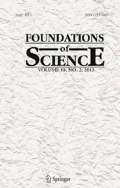Abstract
The present paper aims at showing that there are times when set theoretical knowledge increases in a non-cumulative way. In other words, what we call ‘set theory’ is not one theory which grows by simple addition of a theorem after the other, but a finite sequence of theories T1, ..., T n in which Ti+1, for 1 ≤ i < n, supersedes T i . This thesis has a great philosophical significance because it implies that there is a sense in which mathematical theories, like the theories belonging to the empirical sciences, are fallible and that, consequently, mathematical knowledge has a quasi-empirical nature. The way I have chosen to provide evidence in favour of the correctness of the main thesis of this article consists in arguing that Cantor–Zermelo set theory is a Lakatosian Mathematical Research Programme (MRP).
Similar content being viewed by others
References
Burali-Forti, C.: 1897, Una Questione sui Numeri Transfiniti, Rendiconti del Circolo Matematico di Palermo 11.
G. Cantor (1879) ArticleTitleÜber unendliche, lineare Punktmannigfaltgkeiten I Mathematische Annalen 15 1–7 Occurrence Handle10.1007/BF01444101
G. Cantor (1883b) ArticleTitleÜber unendliche, lineare Punktmannigfaltigkeiten V Mathematische Annalen 21 545–591
Cantor, E.: 1886, Cantor an Eulenburg, part of (Cantor 1887–88), to be found in (Cantor 1962), pp. 405–406.
Cantor, G.: 1887–88, Mitteilungen zur Lehre vom Transfiniten. In Cantor (1962), pp. 378–439.
Cantor, G.: 1895/97 (1955, Contributions to the Founding of the theory of Transfinite Numbers. New York: Dover Publications, Inc.).
G. Cantor (1883a) Grundlagen einer allgemeinen Mannigfaltigkeitslehre Teubner Leipzig
Cantor, G.: 1899, Cantor an Dedekind. In Cantor (1962), pp. 443–447.
Cantor, G.: 1899, Cantor an Dedekind. In Cantor (1962), p. 448.
Cantor, G.: 1962, Gesammelte Abhandlungen. E. Zermelo Editor, Hildesheim: Georg Olms Verlagsbuchhandlung,.
Cauchy, A.L.: 1921, Cours d’analyse algébrique, In Cauchy (1897–99).
Cauchy, A.L.: 1897–99 (Euvres. Gauthier–Villors).
H.G. Dales G. Oliveri (Eds) (1998) Truth in Mathematics Oxford University Press Oxford
J.W. Dauben (1990) Georg Cantor Princeton University Press Princeton, New Jersey
Dauben, J.W.: 1980, The Development of Cantorian Set Theory. In Grattan Guinness (1980), pp. 181–219.
R. Dedekind (1963) Essays on the Theory of Numbers Dover Publications, Inc New York
Dedekind, R.: 1963, The nature and meaning of numbers. In Dedekind (1963b), pp. 44–115.
F.R. Drake D. Singh (1996) Intermediate Set Theory John Wiley & sons Chichester
P. Ernest (1997) ArticleTitleThe Legacy of Lakatos: Reconceptualising the Philosophy of Mathematics Philosophia Mathematica 5 IssueID3 116–134
Fraenkel A.A., Bar-Hillel Y., and Levy A. (1984). Foundations of Set Theory. Second Revised Edition. New York, Oxford: North-Holland, Amsterdam.
Freudenthal, H.: 1971, Did Cauchy plagirize Bolzano?. Archive for History of Exact Sciences 7.
H. Friedman (1971) ArticleTitleHigher set theory and mathematical practice Annals of Mathematical Logic 2 325–357 Occurrence Handle10.1016/0003-4843(71)90018-0
E. Glas (1995) ArticleTitleKuhn, Lakatos, and the Image of Mathematics Philosophia Mathematica 3 IssueID3 225–247
Grabiner, J.: 1984, Cauchy and Bolzano. In Mendelsohn (1984), pp. 105–124.
I. Grattan-Guinness (1979) ArticleTitleBolzano, Cauchy and the New Analysis of the Early Nineteenth Century Archive for the History of the Exact Sciences 6 372–400
I. Grattan-Guinness (Eds) (1980) From the Calculus to Set Theory 1630–1910 Duckworth London
M. Hallett (1984) Cantorian set Theory and Limitation of Size Clarendon Press Oxford
M. Hallett (1979a) ArticleTitleTowards a Theory of Mathematical Research Programmes (I) British Journal for the Philosophy of Science 30 1–25
M. Hallett (1979b) ArticleTitleTowards a Theory of Mathematical Research Programmes (II) British Journal for the Philosophy of Science 30 135–159
Hobson E.W. (1921). The Theory of Functions of a Real Variable and the Theory of Fourier’s Series. Second Edition, Cambridge at the University Press.
T.J. Jech (1973) The Axiom of Choice North-Holland Amsterdam
M. Kline (1972) Mathematical Thought from Ancient to Modern Times Oxford University Press New York
T. Koetsier (1991) Lakatos’ Philosophy of Mathematics A Historical Approach North-Holland Amsterdam
Lakatos, I.: 1983a, Falsification and the Methodology of Scientific Research Programmes. In Lakatos (1983), Vol. I, pp. 8–101.
Lakatos, I. and Zahar, E.: 1983b, ‘Why did Copernicus’s research programme supersede Ptolemy’s?’, In Lakatos (1983), Vol. I, pp. 168–192.
I. Lakatos (1983) Philosophical Papers NumberInSeriesVol. I and II Cambridge University Press Cambridge
P. Maddy (1997) Naturalism in Mathematics Clarendon Press Oxford
D.A. Martin (1975) ArticleTitleBorel Determinacy Annals of Mathematics 102 363–371
E. Mendelsohn (Eds) (1984) Transformation and tradition in science: Essays in honor of I. Bernard Cohen Cambridge University Press Cambridge
G.H. Moore (1982) Zermelo’s Axiom of Choice Springer-Verlag New York, Heidelberg, Berlin
J. Heijenoort Particlevan (1967) From Frege to Gödel Harvard University Press Cambridge, Massachusetts
S. Wagon (1985) The Banach-Tarski Paradox Cambridge University Press Cambridge
Zermelo, E.: 1908, Investigations in the foundations of set theory I. In van Heijenoort (1967), pp. 199–215.
Author information
Authors and Affiliations
Corresponding author
Rights and permissions
About this article
Cite this article
Oliveri, G. Mathematics as a Quasi-Empirical Science. Found Sci 11, 41–79 (2006). https://doi.org/10.1007/s10699-004-5912-3
Issue Date:
DOI: https://doi.org/10.1007/s10699-004-5912-3



